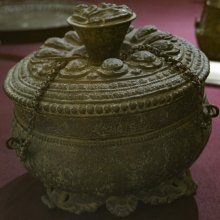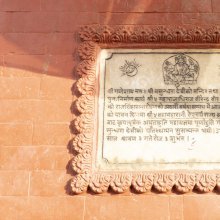Bata, Baṭa, Bātā: 10 definitions
Introduction:
Bata means something in Hinduism, Sanskrit, Marathi, Hindi, biology. If you want to know the exact meaning, history, etymology or English translation of this term then check out the descriptions on this page. Add your comment or reference to a book if you want to contribute to this summary article.
Alternative spellings of this word include Baat.
Images (photo gallery)
Biology (plants and animals)
Source: Google Books: CRC World Dictionary (Regional names)1) Bata in Papua New Guinea is the name of a plant defined with Persea americana in various botanical sources. This page contains potential references in Ayurveda, modern medicine, and other folk traditions or local practices It has the synonym Laurus persea L. (among others).
2) Bata in Senegal is also identified with Senna occidentalis It has the synonym Cassia planisiliqua L. (etc.).
Example references for further research on medicinal uses or toxicity (see latin names for full list):
· Journal of Ethnopharmacology (2005)
· Memoirs of the New York Botanical Garden (1966)
· Denkschriften der Koeniglich-Baierischen Botanischen Gesellschaft in Regensburg (1822)
· Journal of the Washington Academy of Sciences (1920)
· Listados Florísticos de México (1983)
· Novon (2002)
If you are looking for specific details regarding Bata, for example health benefits, pregnancy safety, chemical composition, side effects, diet and recipes, extract dosage, have a look at these references.

This sections includes definitions from the five kingdoms of living things: Animals, Plants, Fungi, Protists and Monera. It will include both the official binomial nomenclature (scientific names usually in Latin) as well as regional spellings and variants.
Languages of India and abroad
Marathi-English dictionary
Source: DDSA: The Molesworth Marathi and English Dictionarybaṭa (बट).—m A strong and well-made kind of pony. 2 C A large marble, a taw. 3 n A kind of iron. 4 f A quantity of the fibres of hemp &c. as clotted together, or as lying in preparation for being rolled into yarn. Hence applied to a disorderly tress or a clotted lock of hair. 5 f m pl Young and short hairs of the head. 6 n The steel-head of the stonesplitter's sutakī.
--- OR ---
baṭa (बट).—a Short and stout, compact.
--- OR ---
batā (बता).—m R Commonly battā.
--- OR ---
bāṭa (बाट).—m (baṭṭā) Pollution; unfitness for social intercourse (through disregard of the distinction between pure and impure, or as explained under the verb bāṭaṇēṃ). v paḍa, asa. 2 Stain, slur, sully, blemish, occasion for blame (in persons or things). v ṭhēva, paḍa, asa.
--- OR ---
bāṭa (बाट).—a Sharp, cunning, knowing, clever, skilled in knavish or vulgar accomplishments. 2 Understood by many in the sense of bāṭagā or bāḍagā, dāṇḍagā &c., and used of man, child, horse, bull &c. Violent, savage, fiery, high-mettled, turbulent, unmanageable.
--- OR ---
bāta (बात).—f ( H) Idle talk; empty speech; an idle story. bātā uḍaviṇēṃ-phēṅkaṇēṃ-hākaṇēṃ &c. To raise reports; to spread rumors. bātā kuṭaṇēṃ -khabāḷaṇēṃ -chāṭaṇēṃ -māraṇēṃ- hāṇaṇēṃ &c. To gabble, clack, chatter; to tell idle stories.
Source: DDSA: The Aryabhusan school dictionary, Marathi-Englishbaṭa (बट).—m A strong pony. A large marble. n A kind of iron. f A quantity of the fibres of hemp &c. as clotted to- gether. A disorderly tress or a clott- ed lock of hair. f m pl Steel-head of the stone splitter's sutakī.
--- OR ---
baṭa (बट).—a Short and stout, compact.
--- OR ---
bāṭa (बाट).—m Pollution; unfitness for social intercourse; stain. a Sharp.
--- OR ---
bāta (बात).—f Idle talk; empty speech. bātā uḍa- viṇēṃ Raise reports. bātā chāṭaṇēṃ Chatter; tell idle stories. bātā māraṇēṃ-jhōkaṇēṃ Give bloated and pompous report, indulge in exaggeration.
Marathi is an Indo-European language having over 70 million native speakers people in (predominantly) Maharashtra India. Marathi, like many other Indo-Aryan languages, evolved from early forms of Prakrit, which itself is a subset of Sanskrit, one of the most ancient languages of the world.
Sanskrit dictionary
Source: DDSA: The practical Sanskrit-English dictionaryBata (बत).—ind. A particle expressing :-
1) Sorrow, regret (alas !); बयं बत विदूरतः क्रमगता पशोः कन्यका (bayaṃ bata vidūrataḥ kramagatā paśoḥ kanyakā) Mālatīmādhava (Bombay) 3.18; अहो बत महत् पापं कर्तुं व्यवसिता वयम् (aho bata mahat pāpaṃ kartuṃ vyavasitā vayam) Bhagavadgītā (Bombay) 1.45.
2) Pity or compassion; क्व बत हरिणकानां जीवितं चातिलोलम् (kva bata hariṇakānāṃ jīvitaṃ cātilolam) Ś.1.1.
3) Addressing, calling; बत वितरत तोयं तोयवाहा नितान्तम् (bata vitarata toyaṃ toyavāhā nitāntam) G. M.; R.9.47.
4) Joy or satisfaction; अपि बत मधुपुर्या- मार्यपुत्रोऽधुनास्ते (api bata madhupuryā- māryaputro'dhunāste) Bhāgavata 1.47.21; अहो बतासि स्पृहणीयवीर्यः (aho batāsi spṛhaṇīyavīryaḥ) Kumārasambhava 3.2.
5) Wonder or surprise; वनजे नेति बलं बतास्ति सत्त्वे (vanaje neti balaṃ batāsti sattve) Kirātārjunīya 13.8; अहो बत महच्चित्रम् (aho bata mahaccitram) K.154.
6) Censure,
7) Truth (satyārtha); कल्याणी बत गाथेयं लौकिकी प्रतिभाति माम् (kalyāṇī bata gātheyaṃ laukikī pratibhāti mām) Rām.5.34.6. For the meanings of बत (bata) with अहो (aho) see under अहो (aho).
Source: Cologne Digital Sanskrit Dictionaries: Cappeller Sanskrit-English DictionaryBata (बत).—1. interj. of astonishment or regret (also batāre, aho bata & ayi bata).
--- OR ---
Bata (बत).—2. [masculine] weakling.
Source: Cologne Digital Sanskrit Dictionaries: Monier-Williams Sanskrit-English Dictionary1) Bata (बत):—1. bata ind. (later usually vata; [gana] svar-ādi) an interjection expressing astonishment or regret, generally = ah! oh! alas! (originally placed immediately after the leading word at the beginning of a sentence, or only separated from it by iva; rarely itself in the first place e.g. [Mālavikāgnimitra iii, 21/22]; in later language often in the middle of a sentence), [Ṛg-veda]; etc.
2) 2. bata m. a weakling, [Ṛg-veda x, 10, 13.]
[Sanskrit to German]
Sanskrit, also spelled संस्कृतम् (saṃskṛtam), is an ancient language of India commonly seen as the grandmother of the Indo-European language family (even English!). Closely allied with Prakrit and Pali, Sanskrit is more exhaustive in both grammar and terms and has the most extensive collection of literature in the world, greatly surpassing its sister-languages Greek and Latin.
Hindi dictionary
Source: DDSA: A practical Hindi-English dictionary1) Baṭa (बट) [Also spelled bat]:—allomorph of `[bāṭa]' (way; weight); a twist (in a string, rope, etc.); ~[māra] a highwayman, robber; ~[mārī] waylaying, robbing.
2) Bata (बत):——an allomorph of [bāta] used as the first member in several Hindi compound words; ~[kahī] prolonged talk, conversation; discussion; ~[baḍhāva] stretching things far more than justified; altercation; carrying an exchange of words too far.
3) Bāṭa (बाट) [Also spelled baat]:—(nf) path, way, course; (nm) a weight; used as the second member in the reduplicative compound [ṭhāṭha-bāṭa] (see); -[kā roḍā] an impediment, a hindrance; -[johanā/dekhanā] to kick one’s heels, to wait for, to await anxiously; -[pāranā] to waylay.
4) Bāta (बात) [Also spelled baat]:—(nf) a thing; matter; fact; point; counsel; talk; discourse; discussion; negotiation; saying; utterance, statement; commitment; word; context; credit; (pl.) [vāteṃ] matters; talk, gossip; affairs; sayings; utterances; discourse; -[āī-gaī honā] a matter to be lost and gone; to be forgotten and forsaken; -[ānā] the topic to have arisen, the context to have presented itself; -[ānā, kisī para] the blame/responsibility to devolve upon; -[ā paḍanā] the context to have presented itself; the topic to have arisen; the responsibility to be cast upon/devolve on; -[ugalanā] to speak out the truth, to divulge a secret; —[uchālanā] to give a wide publicity to a matter (for slander, defamation, etc.); -[uṭhānā] to raise a matter; -[uḍanā] a rumour to get afloat, a rumour to go round; -[uḍānā] to set a rumour afloat, to cause a rumour to go round; -[ulaṭanā] to go back on one’s word, to prevaricate; -[karanā] to speak/talk/converse; -[kahate] in an instant, in a moment, in no time; -[kā ora-chora] the logic/rationale behind a thing, the real import of an utterance; -[kāṭanā] to cut one short, to intervene, to interrupt one in one’s speech, to break the thread of an utterance; -[kā dhanī/pakkā/saccā] true to one’s word, faithful to one’s promise; -[kāna meṃ paḍanā] to get an inkling of something, to get to know something by chance; -[kā bataṃgaḍa] much ad about nothing; making a mountain out of a mole-hill; to exaggerate beyond all limits; -[kī taha] the real import of a thing/statement, meaning of an utterance in the ultimate analysis; -[kī bāta] just a technicality; just a question of prestige; just a contest to preserve one’s honour; -[kī bāta meṃ] in an instant, instantaneously, suddenly; -[khaṭakanā] to feel bad about something; to raise a feeling of suspicion; -[khālī jānā] an utterance to go waste, one’s words to have no effect; -[khulanā/phūṭanā] a secret to leak out, a secret to become public; -[kholakara kahanā] to state in details, to elaborate; -[gaḍhanā] to make up/concoct a story, to fabricate a tale; -[gāṃṭha giraha meṃ bāṃdhanā] to bear something always in mind, to make a permanent note of something; -[gola karanā] to evade a topic/statement, to cleverly avoid saying something; not to make a committal statement; -[cabā jānā] to swallow one’s word; -[calānā] to initiate a topic, to broach a conversation, to raise a point; -[cheḍanā] to broach a conversation, to initiate discussion on a topic; to take up or renew a dispute or altercation; -[jānā] to fail to honour a commitment; a pledge to be dishonoured; a pledge to fall; -[ṭālanā] to put off, to make excuses, to evade; -[ṭūṭanā] negotiations to break down; -[ṭhaharanā] an engagement to be fixed; the terms of marriage to be settled; -[ḍālanā] to reject a request; to turn down a request, to make a request ineffective; -[dabānā] to hush up a matter; -[duharānā] to reiterate a point; to repeat a thing; to harp on a thing, -[na karanā, sīdhe muṃha] to be too arrogant to talk, to give no lift; -[na nikālanā, muṃha se] to be dumbfounded, to be rendered speechless; -[na pūchanā] to evince no care/concern/feeling for; to care nothing for; -[nikalanā] a topic to be broached, a point to be raised; -[nikalavānā] to uncover the truth; to force to speak the truth; -[pakanā] a matter to mature; [pakkī karanā] to make an assurance doubly sure; to confirm an engagement; -[pakaḍanā] to seize censoriously on what is said, to carp or cavil at; to take a statement rather too literally; -[pacanā] a secret to be contained, a secret to be kept; -[para aḍanā] to be firm on one’s stand, to stick unmovably to one’s statement; -[para jānā] to go by one’s word; to take one’s words at their face value; -[para khāka ḍālanā] to let bygones be bygones; to forget and forgive; -[palaṭanā] to change one’s ground, to back out from one’s word, to prevaricate; -[pānā] to get to the bottom of an affair; -[pī jānā] to suppress one’s emotion; to endure quietly; -[pūchanā] to pose a question; to enquire after, to evince care/concern/feeling for; -[phūṭanā] see -[khulanā; -pheṃkanā] to taunt, to jeer, to mock; -[phailanā] something to get wide publicity, to become public knowledge; -[baḍhānā] to aggravate a dispute, to spin out an altercation, to make a serious affair of; -[badalanā] to depart from one’s word, to shuffle, to change one’s ground, to put a new face on; to say one thing and do another; -[bananā] to successfully attain one’s aim, to answer well, things to mould as wished; to gain credit; ~[banāū] an adept in making excuses; a time server; an expert fabricator of tales; -[banānā] to talk much/tall, to make up stories; to talk grandly, to boast; to cause to be accomplished sucessfully; -[bāṃdhanā] to sophisticate, to prevaricate; -[bāta para bigaḍa jānā] to have a chip on one’s shoulder, to be quick to take offence; -[bāta meṃ] in each and every word, in every case or instance; in every respect; throughout; in mere talks, in no time; -[bigāḍanā] to mar a prospect, to spoil an affair, to thwart/frustrate; to bring disgrace on; -[bilakula ulaṭī honā] the boot to be on the other leg; -[mata karo] hold your tongue!, enough of it!; -[mana meṃ basanā] a point/statement/fact to be borne in mind; something to make a deep impress on the mind; -[mānanā] to comply with one’s counsels, to heed somebody’s suggestion; -[muṃha se le jānā] to take words out of one’s mouth, to anticipate and reproduce somebody’s intended utterance; -[meṃ bāta milānā] to chime in, to concur; -[meṃ pharka ānā] to change one’s stand; to lose credit/repute; things to be different from what they were; -[meṃ se bāta nikālanā] to drag out or prolong an argument; to carp or cavil at an argument; to read in between the lines; to draw subtle inferences one after the other; -[rakhanā] to honour somebody’s word; to keep one’s credit unimpaired; to maintain somebody’s honour unsullied; -[rahanā] to see one’s commitment honoured; one’s word to be fulfilled or complied with; to get the better in argument; to prevail; -[laganā] to feel hurt/offended by one’s words; -[saṃbhāla lenā] to put a good/bold face on (a matter); -[sunanā] to give due attention to; to follow the advice of; -[halkī] [paḍanā] to lose one’s esteem; one’s utterance not to produce its expected impact; to be discredited; [bāteṃ kama lāteṃ jyādā] more kicks than half-pence; [bāteṃ, cikanīcupaḍī] oily words, flattering utterances; [bāteṃ chāṃṭanā] to talk a bit too much; [bāteṃ baghāranā] to talk grandly, to speak out splendid nothings; to boast; [bāteṃ milānā/lagānā] to tell tales; to back-bite, to calumniate; [bāteṃ sunānā] to give a bit of one’s mind, to talk harsh things; to revile; to tell one’s tale; [bātoṃ kā caskā honā] to have itching ears; [bātoṃ kā dhanī/bādaśāha] an empty talker, a gas-bag; [bātoṃ kī jhaḍī] an incessant flow of talks, a continuous downpour of talks; [bātoṃ kī puḍiyā] too talkative, loquacious; a chatter-box; [bātoṃbātoṃ meṃ] in the course of a conversation; just in fun; without being serious; in no time; [bātoṃ meṃ ānā] to be taken in; to be cajoled into accepting one’s words at their face value; [bātoṃ meṃ uḍānā] to talk somebody out, to turn off with a jest; [bātoṃ meṃ bahalānā] to beguile with words, to talk (somebody) into compliance; [bātoṃ meṃ lagānā] to engage in conversation, to occupy one’s attention; [bātoṃ se peṭa nahīṃ bharatā] fine words butter no parsnips; the tune the old cow died of; to advise instead of giving relief.
...
Kannada-English dictionary
Source: Alar: Kannada-English corpusBaṭa (ಬಟ):—
1) [noun] a boldly-courageous, brave man.
2) [noun] a person who serves in an army; a person engaged in military service; a soldier.
3) [noun] a person employed by another to perform personal and menial duties; a servant.
4) [noun] a subcaste in the coastal Karnāṭaka, the members of which are engaged mainly in agriculture.
--- OR ---
Bata (ಬತ):—[noun] any religious act or obligation enjoined by the gods; any meritorious act of devotion or austerity; a vow.
--- OR ---
Bata (ಬತ):—[noun] (math.) the process of uniting two or more numbers into one sum; addition.
--- OR ---
Bāṭā (ಬಾಟಾ):—[noun] a road; a way.
Kannada is a Dravidian language (as opposed to the Indo-European language family) mainly spoken in the southwestern region of India.
See also (Relevant definitions)
Starts with (+107): Bata belanjen, Bata foia kani, Bata foro, Bata liffi, Bata melanjen, Bata-bakuri-araung, Bata-bata, Bata-damba, Bata-kirey, Bata-lagnu, Bata-marnu, Bataan, Bataani, Bataani kadale, Bataata, Bataate, Batabata, Batabi-lebu, Batachapai, Batacita.
Ends with (+280): A-bata, Ababata, Abata, Abbata, Abhabbata, Acacia dealbata, Adenia lobata, Adenia trilobata, Ahogangapabbata, Ajjibata, Ajjuhattha Pabbata, Akabata, Akheranaubata, Aklibata, Alabata, Albata, Ambata, Ambatacimbata, Ampelocissus barbata, Angarapabbata.
Full-text (+166): Bat, Bata-bata, Batagela, Bata belanjen, Bata melanjen, Baat, A-bata, Batamogarem, Batanata, Bata liffi, Bata foia kani, Thata, Bata-bakuri-araung, Ikmong-bata, Bata foro, Bata-damba, Pakki-bata, Bata-kirey, Pakki-baat, Natabata.
Relevant text
Search found 40 books and stories containing Bata, Baṭa, Bātā, Batā, Bāṭa, Bāta, Bāṭā, Baataa; (plurals include: Batas, Baṭas, Bātās, Batās, Bāṭas, Bātas, Bāṭās, Baataas). You can also click to the full overview containing English textual excerpts. Below are direct links for the most relevant articles:
Rig Veda (translation and commentary) (by H. H. Wilson)
Chaitanya Bhagavata (by Bhumipati Dāsa)
Verse 2.9.86 < [Chapter 9 - The Lord’s Twenty-One Hour Ecstasy and Descriptions of Śrīdhara and Other Devotees’ Characteristics]
Verse 1.15.85 < [Chapter 15 - Marriage with Śrī Viṣṇupriyā]
Verse 2.7.60 < [Chapter 7 - The Meeting of Gadādhara and Puṇḍarīka]
Vastu-shastra (2): Town Planning (by D. N. Shukla)
Beautification (b): Gardens, etc. < [Chapter 6 - Deification and Beautification of Towns]
Brihad Bhagavatamrita (commentary) (by Śrī Śrīmad Bhaktivedānta Nārāyana Gosvāmī Mahārāja)
Verse 2.2.63 < [Chapter 2 - Jñāna (knowledge)]
Verse 2.2.232 < [Chapter 2 - Jñāna (knowledge)]
Verse 2.1.61 < [Chapter 1 - Vairāgya (renunciation)]
The Literature of the Ancient Egyptians (by E.A. Wallis Budge)
Sahitya-kaumudi by Baladeva Vidyabhushana (by Gaurapada Dāsa)
Text 11.15 < [Chapter 11 - Additional Ornaments]
Text 10.60 < [Chapter 10 - Ornaments of Meaning]
Text 10.119 < [Chapter 10 - Ornaments of Meaning]




